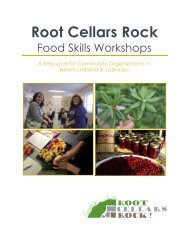Bulk Buying Club Best Practices Toolkit - The Food Security Network ...
Bulk Buying Club Best Practices Toolkit - The Food Security Network ...
Bulk Buying Club Best Practices Toolkit - The Food Security Network ...
Create successful ePaper yourself
Turn your PDF publications into a flip-book with our unique Google optimized e-Paper software.
Appendix C: Basic Adult Education Principles<br />
If instructing bulk buying club participants about food safety and nutrition is<br />
going to be part of your group‟s focus, keep in mind the ways that your group<br />
members learn. <strong>The</strong> foundation of adult education is the belief that all<br />
individuals are unique in their experiences, knowledge, views, abilities, skills and<br />
talents. Each individual learns in a unique way; this uniqueness is an opportunity<br />
for sharing and growth. Keep these key adult education principles in mind as<br />
you plan, facilitate, and evaluate education sessions:<br />
Involve learners in all aspects of the process<br />
Ask people about their education needs and how they learn best. You can<br />
determine their needs formally through a needs assessment or informally through<br />
dialogue with an individual or a group. Needs assessments can be especially<br />
useful for long-term planning or large projects.<br />
Let everyone be a learner and a teacher<br />
Everyone has something special to contribute to a one-on-one teaching session<br />
or to a group. Some individuals may ask questions, others may be able to<br />
provide answers to questions; everyone has experiences which they may be<br />
willing to share. Even in a one-on-one situation, both individuals involved can be<br />
both learners and teachers. <strong>The</strong> educator can walk away from the experience<br />
richer in knowledge as can the person who is seeking the education.<br />
Create a learning environment<br />
Most people need to be comfortable to participate and to share thoughts and<br />
experiences. It is important to create a learning environment in which everyone<br />
feels respected. In addition, it is essential that all learners have the opportunity<br />
to participate as they feel comfortable.<br />
In a one-on-one situation, good listening skills and a sincere interest to engage<br />
the learner are critical. In a group setting, the environment can be created<br />
subtly by the educator setting his or her own example, or it can be created<br />
formally by asking the group to identify what is the ideal learning environment<br />
for them. One way of doing this is to ask the group to define group participation<br />
guidelines. This is a helpful way to create a culture of respect that does not<br />
require a great deal of input from the educator, except to facilitate the<br />
discussion.<br />
30









